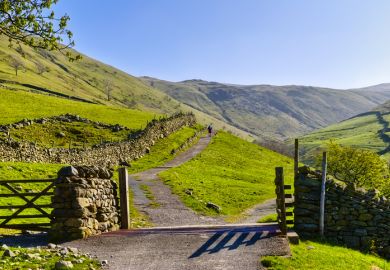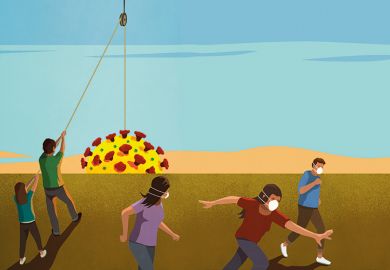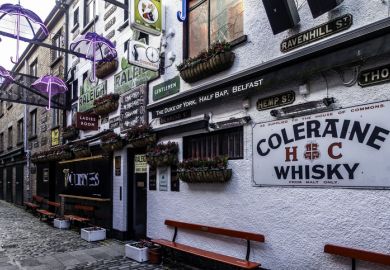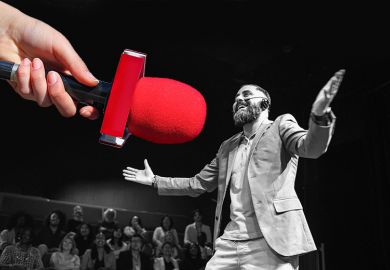A few months ago, it would have been hard to believe that research-based knowledge at the forefront of science would soon become an everyday topic of conversation. Reproduction rate and theories of viral origin and spread are discussed at kitchen tables around the globe – but perhaps most urgently around the cabinet tables of national decision-makers.
Politicians and government officials are on a steep, at times brutal, learning curve as they make urgent and consequential choices about how to deal with the coronavirus crisis by weighing up a plethora of doubtful premises. The stream of problems to be dealt with is overwhelming and the effectiveness of the available solution is not always easy to predict. Decision-makers are caught up in a whirlwind.
So is the global research system. Scientists have responded massively to the challenge and disciplinary knowledge is demonstrating the great value of its scientific depth. Yet, faced with the truly wicked problems thrown up by the pandemic, the importance of multidisciplinary and interdisciplinary collaboration becomes obvious, too.
We all need a degree of scientific multilingualism. The crisis goes far beyond medical issues, to factors such as the spread of infection and how it can be limited and the underlying mechanisms for possible vaccines. We are also acutely dependent on gaining insight into how factors such as culture, demographics, the organisation of national health services, public administration and industry work together to influence the effectiveness of government efforts to combat the spread of the virus.
The same applies to the societal, economic and political consequences of partial lockdowns. The world has become an uncomfortable laboratory for the study of such complex interrelationships.
Urgency presents us with a major challenge, however. Speed is necessary, but cannot override the need for reliable studies that adhere to principles of research ethics and scientific methodology. Yet the huge amount of personal, institutional and national prestige potentially on offer for making the decisive scientific contribution, such as a coronavirus vaccine, may challenge that adherence. Under such conditions, there is a real fear that researchers could take shortcuts.
We already see tendencies for research results to be presented more quickly in the daily newspapers than in peer-reviewed channels, and we see institutions controlling what their researchers publish. High-speed quality assurance via peer review is necessary when political action cannot be put on hold, but it remains a challenge.
Yet researchers cannot replace politicians as decision-makers. This is not merely because it would breach democratic norms but also because – as we know from studies of the relationship between public administration, politics and research in general – it is rare that complex phenomena can be reduced to one scientifically unambiguous piece of advice. Uncertainty regarding the effects of infection prevention and control measures give rise to different political narratives around the world about what is the most durable strategy for combating the virus.
Moreover, scientific advice enters a crowded place when it comes to decision-making. Among the other factors that need to be quickly weighed up are legality, legitimacy and the economic and redistributive consequences of alternative strategies.
However, this does not make scientific advice less important. In a “knowledge democracy” there are high expectations that political decisions should also be science-based, justifiable with reference to professional standards. Never in modern times was there such a clear demonstration of the crucial importance of having a scientific “knowledge reservoir” that decision-makers can draw from in acute and high-risk situations.
Therefore, it matters how we on a long-term basis organise science and connect it to politics and public administration in a sustainable way at local, national and – no less importantly – global levels.
Post-corona, we must reflect on many levels, including in academia. One key dimension is the continued need to work towards open science. Attention so far has mostly been on journals (at least in Norway), yet the corona crisis shows that other dimensions of open research are just as important. Data, results and insights must be made available for utilisation, assessment and inspection. And not just the final data; approaches, methods and interpretations must also be released. As academics, we need to exercise due diligence.
It is evident that scientists also need to share their data with the political decision-makers and the general public. And they must be open about scientific controversies, risks and uncertainty. There is nothing to fear from this: surveys show that the population largely trusts science, and amid all of its devastating consequences, the pandemic may even have the benefit of increasing that trust further. It already seems a long while ago that “we’ve had enough of experts” was the dominant refrain – anti-vaccine arguments, for instance, are being given very short shrift.
There may even be further positives arising from the crisis. Better mutual understanding of the roles, needs and interests of all parties involved in decision-making, from politics and public agencies to civil society and industry, may also result in a clearer societal understanding of the role and responsibilities of universities. This would be an important element in better preparing ourselves for future crises.
Åse Gornitzka is vice-rector and Svein Stølen is rector of the University of Oslo.
Register to continue
Why register?
- Registration is free and only takes a moment
- Once registered, you can read 3 articles a month
- Sign up for our newsletter
Subscribe
Or subscribe for unlimited access to:
- Unlimited access to news, views, insights & reviews
- Digital editions
- Digital access to THE’s university and college rankings analysis
Already registered or a current subscriber?









